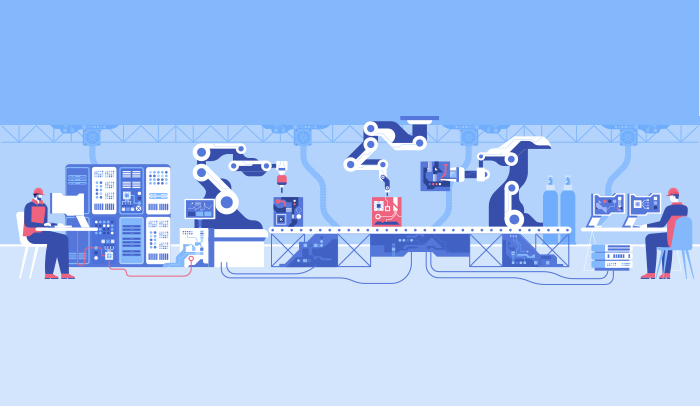
The continuous quest for efficient productivity and increased cost of labour is driving many industries to opt for automation. Industrial automation is a much broader concept than just robotics; it categorizes software and hardware and is a mechanism that combines them both. Over the past years, the automation industry has seen exponential growth, and many industries have switched to automation since then. SMEs and companies that weren’t previously leveraging industrial automation are now part of the game.
We are experiencing an advanced industrial revolution that can handle complex machinery and processes much more efficiently and cost-effectively than ever before. The intervention of automation reduces the requirement of human efforts from redundant and high-risk processes, and allows industries to concentrate on important processes, energy consumption, and safety. Our industries face many technological changes that call for an urgent demand for premium quality high precision products that can be fulfilled only by a high level of productivity. This is where engineering systems, automated manufacturing, and industrial automation comes into the picture.
In the current scenario, AI, 5G, advanced automation, advanced sensing, and many other technologies are already transforming to Industry 4.0 and automation which has majorly transformed the industries and their processes. Industry 4.0, automation focuses on efficiency and optimization and works significantly to reduce margins of error. In a manual process where the margin of error can reach up to 10% when humans carry out the work, an automated platform can reduce it up to 0.00001%.

Besides discrete manufacturing companies, new market players are also entering the industrial automation sector due to the following reasons:
Since automation does not involve much human intervention, it helps in reducing the cost burden of production. In addition, augmented reality and virtual reality facilitate the learning process and improve productivity organization models.
Industrial automation’s nature of technology makes the production process constant and operational 24*7. As a result, it gives competitive advantages in terms of increased productivity, capacity, and process quality, minimizing task errors and the cost of downtime.
Automation 4.0 reduces the information processing time. The platform has a large capacity for the storage and management of data derived from processes.
The industrial segment is dynamic, and the changing tasks require training for a human operator. In contrast, robots and machines are reconfigurable and can be tightly programmed in a strict time frame, thus maintaining scalability and flexibility.
The production line can assign hazardous tasks posing a high risk to the production staff to machines. Additionally, advanced security controls can be implemented for components, equipment, people, and systems.
The automated processes are controlled, monitored, and recorded to generate the big data that helps to identify patterns, improve operations, and implement changes to prevent future task errors.
Although industry 4.0 has been accepted mainly by large-scale enterprises, there are still some challenges that the industrial automation sector faces. Some of these are recurring in nature and have been a roadblock for industries. The challenges in industry 4.0 are:
Besides discrete manufacturing companies, new market players are also entering the industrial automation sector due to the following reasons:
Some industries are more than five decades old. Changing the existing technology and adapting the new technology can be challenging at times and involve huge costs if the necessary infrastructure is required and deciding which solution will be most profitable.
Installing new technology in an existing condition needs extensive strategic planning. A transition is required in terms of machinery and the change of mindset and automation process. Intelligent, detailed analysis is necessary to welcome automation in any running business.
One of the reasons why automation was introduced was to minimize the risks involved by human intervention. Ingenious automatic inventions are no longer working tools but have become an intelligent workforce in itself. Therefore, small, mid-level, and large enterprises must train their workforce from time to time and develop required digital skills that complement the changing type of industry.
Globally, automation is expected to witness exponential growth in the coming years. At the same time, India is adapting to Industry 4.0 at a fair pace and has shown exceptional growth due to the recent advances in automation. There is already a more advanced upcoming trend, Industry 5.0, that focuses on immediate customer service, personalization, and integration between humans and cobots (collaborative robots). The workforce must be trained and qualified to be proactive in the new industrial automation model and welcome new technological developments.